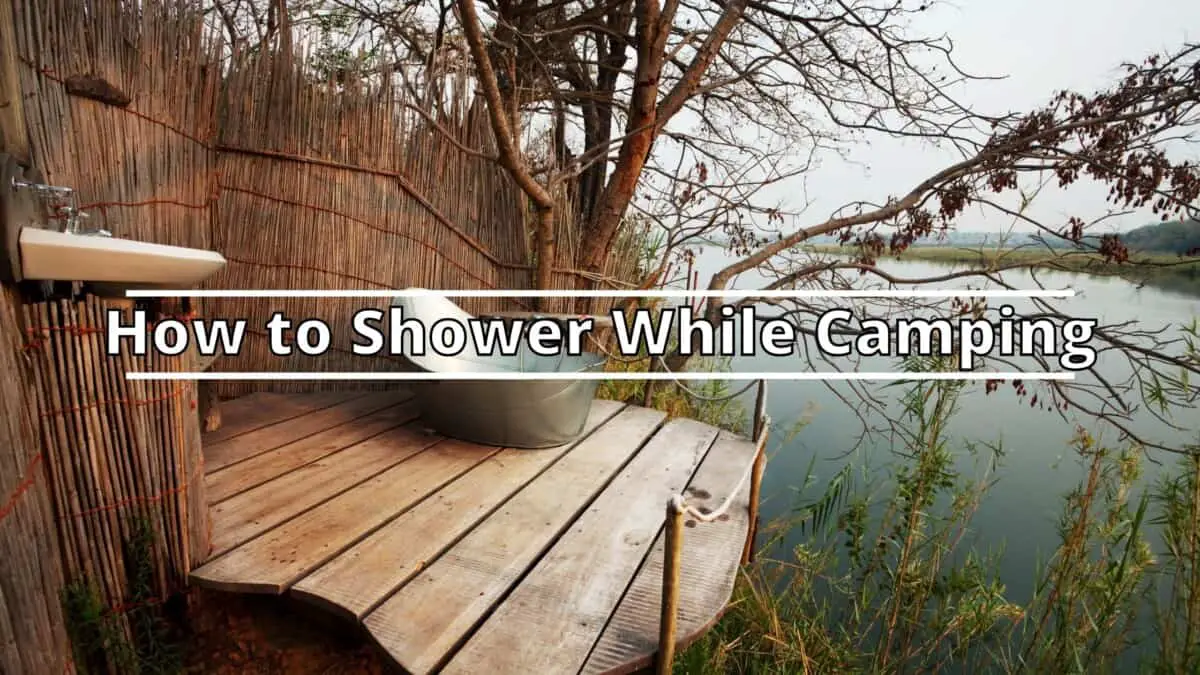When camping, campers shouldn’t neglect their hygiene. Even though the situation limits many things in terms of proper hygiene, there are still tactics that you can do in order to observe proper hygiene. What are these?
To shower while camping, you should consider the essentials that you need to pack, know the ways to bathe during camping, and camping hacks for added advantages. Make sure to practice these techniques, and don’t forget the Leave No Trace principles.
Staying clean is an important aspect of camping. Just because we’re away from bathrooms and running water does not mean that we have to stay filthy. Lucky for us modern nature enthusiasts, camping showers exist. We tested numerous products and we came up with a list of the best camping showers available in the market today.
Essentials you need to shower while camping
The essentials you shouldn’t forget to pack when camping are alcohol or hand sanitizers, biodegradable soap, shampoo, a toothbrush, toothpaste, wipes, tissues, plastic bag, extra outfits, undergarments, and a microfiber towel.
The function of the essentials mentioned are the following.:
1. Alcohol or hand sanitizer
These are handy essentials that you can bring anywhere with you. By using these kinds of substances, you can avoid food contamination, which is caused by hand-to-mouth contact. You will be needing this, especially while camping, as you can’t always wash your hands with water and soap in this context.
Water is sometimes hard to find when camping away from lakes or other water supplies.
2. Biodegradable soap and shampoo
Proper hygiene is crucial in all ways, however, we should also be vigilant about the effects of the substances we are going to use. And the suds of the regular soaps we commonly use can have negative effects to the environment.
So, we advise you to pack biodegradable soap and shampoo to practice environmental conservation when camping.
3. A toothbrush and toothpaste
Some people say their bath feels incomplete if they are unable to brush their teeth. However, one of the most important factors in exercising proper hygiene is, of course, cleaning your mouth.
4. Wipes and tissues
Camping essentials also include toilet paper. These materials can even be a substitute for the water and soap system we are used to. Similarly to alcohol and hand sanitizer, they can be a huge help if the water supply is scarce in the area you are camping in.
5. Plastic bag
This can be used to store your clothes for two purposes: to prevent them from getting wet, and to store your dirty clothes. There are still numerous ways that a plastic bag can aid you, but the usual use is for storage.
6. Extra outfits and undergarments
If you are going to camp for more than a day, then you should bring extra outfits. It will also allow you to wash the outfit you already wore, since you have a supplemental outfit and additional underwear.
7. Microfiber towel
A microfiber towel will work as your medium for fast drying. The towels we commonly use are hard to dry, and take a long time, but with this kind of towels, you can ensure that it is capable of quick drying.
Best practices when bathing while camping
Based on our evaluations and research, we practice these three ways to bathe while camping. The first thing to do is to know your shower habits. The second is to observe water conservation, and the last one is to determine the different means to shower.
We will discuss the above mentioned here.
Know your shower habits
Some people can withstand a few days of not showering, and knowing this before you go camping can help you determine the things you need to pack. The amount of extra outfits and undergarments is also salient.
You can’t just change three times a day if you haven’t packed the right amount of clothes. We also advise you to wash your used outfits when camping. This will allow you to reuse them the next day, to that you won’t have to bring your whole wardrobe with you.
With such, packing just one extra outfit can solve your problems, and reduce the weight of your backpack. Outfits with wool fabrics are a great choice to wear and bring, as they preserve freshness longer. The same thing goes with travel underwear, as they are easy to dry.
Water conservation
Not all camping areas provide a hefty flow of water supply. If you bring water with you and find out that the place doesn’t have nearby lakes nor rivers, be cautious about your usage.
For more information on how much water you will need for a shower, you can check our article “How Much Water Do I Need for My Camping Shower?” in which we discussed the techniques to conserve water, and the time and amount of usage that is necessary for bathing on a camp.
Means
The first idea we recommend is to use camping showers. You can read our article on the “Best Camping Showers” to find the best products on the market today. Another tip is to use sponge baths, with which you can conserve water in a minimal manner.
Next, you can shower in the nearest lakes or rivers. That is if you have an option to go there, as it can indeed provide you with much water. However, please don’t forget to practice the Leave No Trace principle to avoid inflicting harm on your surroundings.
Your last option is public showers. There are places that actually allow you to take showers, and require you to pay a certain fee. It is difficult to locate these in the forests as they are not settled there. We also talked about it in our “Ideal Places to Take a Shower When on the Road” article.
Camping hygiene hacks
There are some hacks that you can follow to stay clean when camping, and these are to use clean outfits and undergarments, practice the Leave No Trace principle, bring sleeping clothes, and wash your hands regularly. You can’t just entrust everything by just showering, and there are a lot of advantages you can find in other methods.
The following are the hacks.
1. Use clean outfits and undergarments
You will be out in a day, and we prefer you to begin your camping adventure by wearing clean outfits and undergarments. They will help you preserve freshness and cleanliness throughout the whole day.
Camping or traveling can make them soaked with sweat. What we advise you to do is to use one underwear per day, if you are going out for several days. For socks, split the amount of camping days into the number of socks you will be packing.
2. Always practice the Leave No Trace principle
That applies to showering, cooking, and even waste materials. This is the best way to protect the environment, since our daily lives involve us in using materials that unconsciously affect nature. Also, use organic and biodegradable essentials.
There are seven fundamentals of this principle, and these are:
- to plan ahead and prepare,
- travel and camp on durable surfaces,
- dispose of waste properly,
- leave what you find where it is,
- minimize campfire impacts,
- respect the wildlife,
- and be considerate of other visitors.
Don’t forget these under any circumstances, even when excreting, and also always wipe after this.
3. Bring sleeping clothes
Don’t just sleep in the clothes you wore the whole day. Not only will it bring you discomfort, but it also can form a smell in your sleeping area, inside the tent. Before you go camping, always include in your checklist separate sleeping clothes.
Resting should be comfortable and permit you to have a good amount of sleep. As previously mentioned, your outfit and undergarments can get soaked in sweat, or even rain, and you may not want to sleep in that condition.
4. Wash your hands (regularly, if possible)
If there is enough water supply around the area, always wash your hands. Before you eat, cook, and when you touch stuff that will dirty your hands. Proper hygiene is very important outside, because it can result in illness if you don’t observe it consistently.
Alcohol and sanitizers are alternatives, but if you just have water around, wash your hands decently, then apply these substances.
Final thoughts
There are several factors you should consider before going on a camping adventure. Apart from backpacking, be attentive to the things that you will be needing during the activity, such as showering. This is one of the top challenges that you will face when you are outdoors because not every campsite is equipped with showers, especially when you are in the backcountry.
Proper hygiene is vital, always and everywhere. Don’t just be content with what you are wearing, and clean your body as much and as often as you can. In implementing the tips we have discussed in this article, we genuinely want to highlight environmental conservation in all of your actions.

